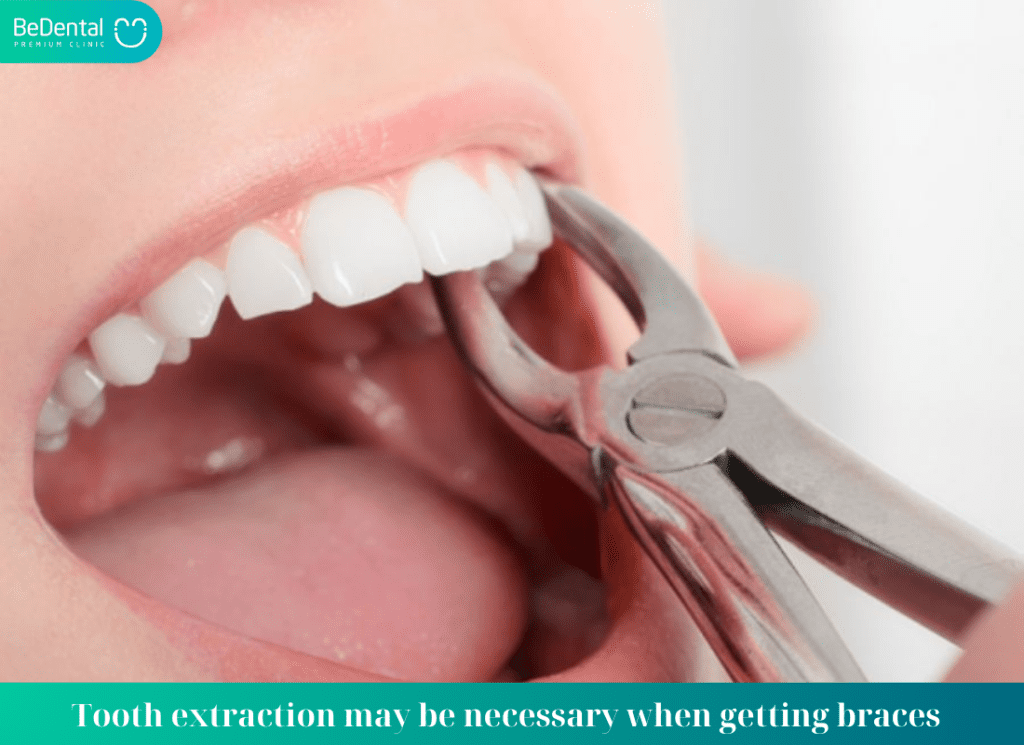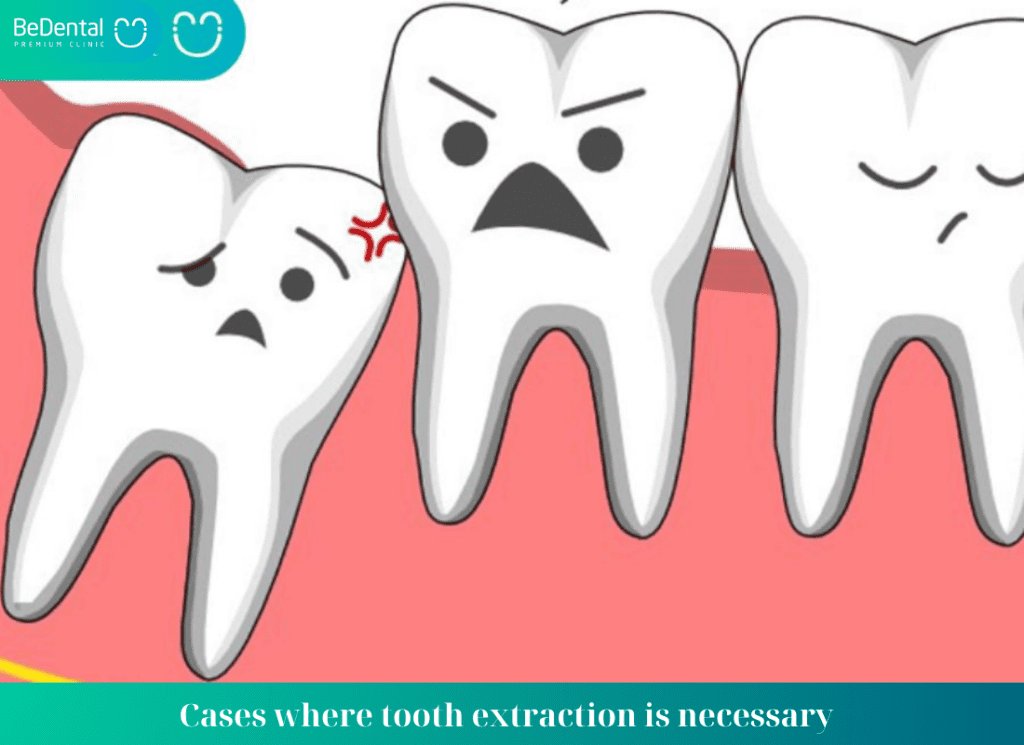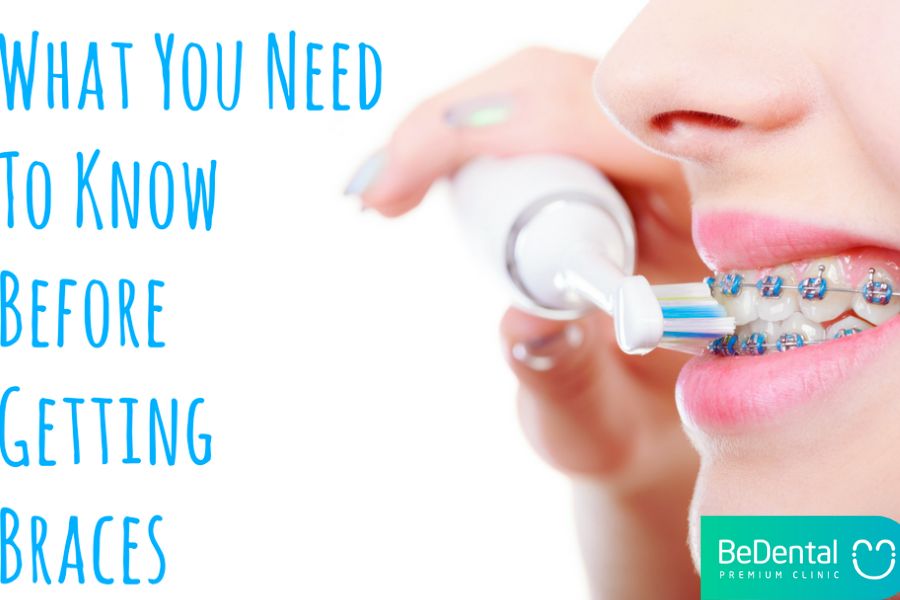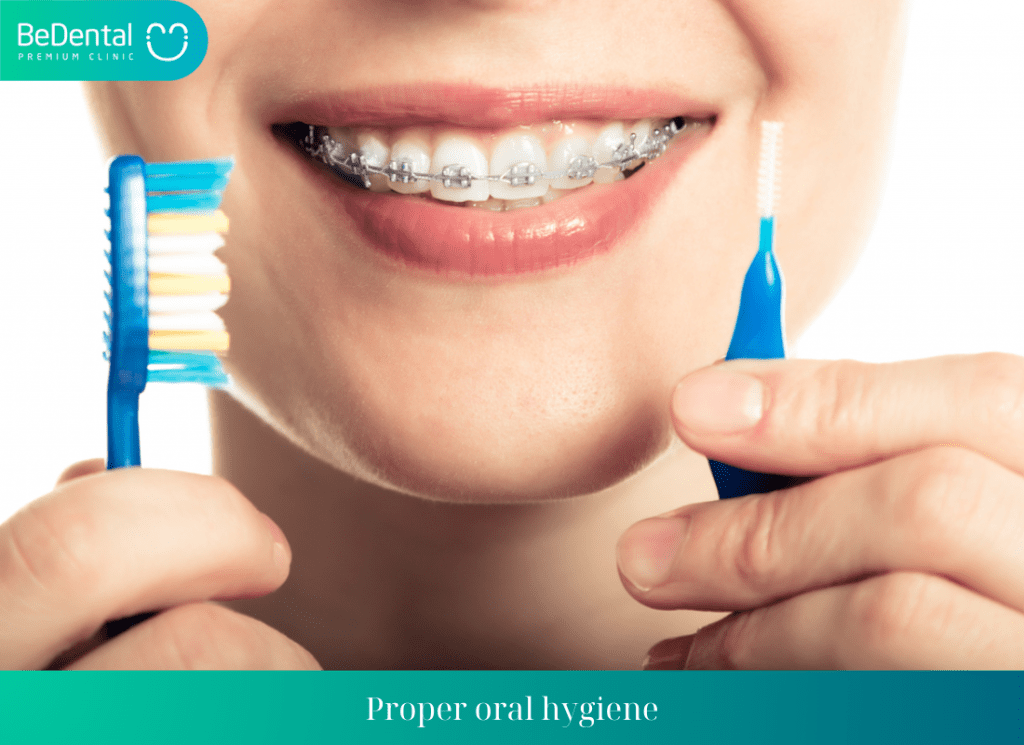Is it necessary to extract teeth before getting braces? Braces are a method to help improve dental imperfections such as crowding, protrusion, spacing, misalignment, etc. However, to have a safe orthodontic process and achieve the best results, you should equip yourself with knowledge before, during, and after getting braces. When getting braces, many people often wonder if they can eat after getting braces. How to achieve the highest orthodontic effectiveness? Let’s find out in the following article.
Is it necessary to extract teeth before getting braces?
The main purpose of getting braces is to adjust the alignment of the teeth, bringing them to proper positions with specialized orthodontic devices, to give you a set of even, symmetrical teeth and a more confident smile. In some cases, to create space between teeth and help align misaligned teeth more evenly, tooth extraction may be necessary when getting braces. Tooth extraction during orthodontic treatment will be carefully evaluated by the dentist to determine the appropriate treatment plan based on the condition of the teeth at that time.

Not only does tooth extraction create space to help teeth move to the correct position, but extracting teeth before getting braces can also minimize the risk of developing serious oral health-related complications. Additionally, tooth extraction can prevent overcrowding during the orthodontic process.
However, not all cases of getting braces require tooth extraction. For dental arches with enough space to align the teeth properly in the orthodontic phase, including sparse teeth or teeth not excessively thick, the dentist will prioritize using non-extraction methods to achieve the desired results while preserving the original number of teeth.
Does tooth extraction for braces affect the patient’s health?
Teeth and nerves are closely related. Therefore, extracting teeth before getting braces can be a challenging choice for many people. Firstly, it can be affirmed that tooth extraction for braces does not have a negative impact on health. Additionally, not all cases require tooth extraction before getting braces.
To make the final decision, the team of dentists undergoes a thorough calculation and careful consideration based on the patient’s health condition, dental health, and the necessity of tooth extraction for the braces process.
Additionally, before that, the patient will undergo a comprehensive examination and X-ray. However, to ensure absolute safety for the patient, the following requirements must be followed:
- A highly skilled and experienced doctor is an important factor in ensuring a successful treatment session for the patient. Based on experience from previous surgical cases, the doctor will make the correct decision on the number of teeth to be extracted or the structure of the dental arch. As a result, the tooth extraction process proceeds smoothly, quickly, and without any errors. The time for tooth extraction before braces is shortened so that the patient can quickly rest and recover their health afterwards.
- The clinic is equipped with modern facilities: In addition to the main factor being the doctor, the physical infrastructure of the clinic is also equally important. Therefore, when extracting teeth before getting braces, the patient is administered local anesthesia.
See more: Why do children have bad breath
After that, the doctor will use modern tools to perform the tooth extraction surgery. At this point, the modern equipment system will be the main tool to help in the treatment process. Once the tooth extraction site fully heals, the doctor will begin attaching braces and orthodontic treatment.
When is tooth extraction necessary, and when is it not needed for braces?
Cases where tooth extraction is necessary
What are some Cases where tooth extraction is necessary? Firstly, it is important to understand that tooth extraction is not a priority indication in dentistry because above all, the doctor understands the client’s psychology and will consider alternative, safer options that still ensure effectiveness. In cases where tooth extraction is more effective than other methods, after assessing the patient’s health conditions, the doctor may recommend tooth extraction.

In addition, before deciding whether to extract teeth or not, the doctor will carefully review clinical data such as X-ray films. Typically, teeth will be recommended for extraction in the following cases:
- Protruding or severely crowded teeth: Extracting teeth not only helps create space for teeth to move but also adjusts the bite to the correct standard, which is good for the chewing process.
- Crooked or crowdedly growing teeth: This often occurs in cases where the jaw is too small, not providing enough space for all teeth to grow properly, causing teeth to grow crowded or misaligned. Therefore, in order to achieve the best results in braces, the doctor may need to extract teeth to adjust them to the desired position.
- Impacted or misaligned wisdom teeth in adults: In cases where wisdom teeth are impacted or misaligned, the doctor must recommend extraction to help the orthodontic process achieve maximum effectiveness and protect other teeth.
- Typically, wisdom teeth tend to push up the gums when they grow, and if there is not enough space, there is a high risk of crowding the adjacent teeth, causing the teeth to grow in a misaligned direction, overlapping each other.
See more: The process of root canal treatment
Cases where tooth extraction is not necessary
Contrary to the common cases mentioned above, many people do not need to extract teeth for braces but can still achieve more successful results than expected. This is when they fall into one of the following cases:
Having a wide enough jaw arch: with enough space for teeth to move to the desired position.
Overlapping teeth: these individuals have a larger jaw than tooth arch. Orthodontic treatment helps improve the aesthetics and chewing function of the dental arch. In this case, tooth extraction before braces is no longer necessary.
People needing orthodontic treatment between the ages of 12 and 16: during this golden period, most suitable for braces. As the teeth are still developing, they can easily shift with the impact of orthodontic appliances, making the orthodontic process simpler and easier. Patients can keep all their teeth without needing to extract any.
Too few teeth, teeth not closely aligned, or teeth too small: there are many gaps between the teeth. The jaw structure already has enough space for teeth to shift positions. There is no need for tooth extraction, as orthodontic treatment will bring the teeth closer together, making them even and aligned.
4) Precautions before and after getting braces
4.1) Before getting braces:

1. What level of dental check-up
To choose the appropriate braces method, the first thing you need to do is visit the dentist for an examination to determine the level of complexity of your dental condition. Typically, at this stage, you will have X-ray images taken and dental impressions made.
2. Determine which braces method is needed for your dental condition
- Overbite: This is one type of malocclusion where there is a misalignment between the upper and lower teeth.
- Underbite: This is another type of malocclusion where there is a misalignment between the upper and lower jaws, creating a concave facial appearance, leading to disharmony; when the mouth is closed, the lower teeth cover the upper teeth on the outside.
- Gaps between teeth: This is a condition where teeth grow far apart on the dental arch, causing difficulty in chewing function and especially affecting aesthetics.
- Crooked teeth: This is a condition where teeth grow in a crowded manner, causing misalignment of the bite and affecting the facial aesthetics.
See more: What is teeth tightening during braces?
3. Thoroughly research different braces methods
Currently, there are many braces methods for you to choose from. However, to find the method suitable for your dental condition, aesthetic needs, and financial situation, you should research thoroughly before getting braces. There are four common braces methods:
- Traditional metal braces
- Ceramic braces
- Lingual braces
- Invisalign clear aligners
4. Choose braces from reputable dental clinics
On dental forums and braces groups, it is not difficult to come across posts about braces going wrong. Do you know the main reason for this? It is mainly due to lack of trust and choosing low-quality dental clinics for orthodontic treatment.
Therefore, to help you have a safe and highly effective braces process, minimize discomfort during the braces period, it is advisable to thoroughly research and choose a reputable dental clinic for braces.
4.2) After getting braces
Entering the phase of having braces like separators, tooth extractions, attaching brackets, tightening wires, etc., in the beginning, you may feel a bit of pain and discomfort. Especially, eating and oral hygiene will be a bit more challenging. However, as long as you pay attention to the following things, everything will not be difficult at all.
1. Proper oral care

After getting braces, you will have additional brackets on your teeth, making dental hygiene more difficult. During this time, you should spend time cleaning your teeth thoroughly to avoid food particles sticking on the teeth or brackets, which can lead to plaque buildup, bad breath, cavities, gum inflammation, etc.
According to the dentists at Up Dental Clinic, you should brush your teeth at least 2 times a day, especially after meals for 30 minutes. You can use tools like dental floss, water flossers, etc., to facilitate the food removal process.
2. Proper eating habits after getting braces
In the first few days of having braces, you are not yet accustomed to the appliances and the teeth movement, so during this phase, you should consume soft foods like porridge, soup, milk, well-cooked dishes. For foods like meat, fish, fruits, you should cut them into small pieces to eat, avoiding cases of brackets coming loose or breaking.
In addition, to ensure a smooth and safe braces process, you should limit the consumption of the following foods:
- Hard, tough, sticky foods: These foods should be limited as they can cause brackets to come loose or break the wires.
- Colored foods like beetroot, curry, etc., should also be limited because if not cleaned properly, they can stick on the teeth and wires, affecting aesthetics.
- Sugary foods like candies, pastries, etc., should be avoided as sugar can stick to the teeth, leading to oral health issues.
If you accidentally dislodge a bracket during the braces process, when you notice it, you should contact the dental clinic to arrange for the dentist to securely reattach the bracket. In case you cannot visit the dental clinic immediately, do not worry too much. Keep the bracket and contact the dentist or dental assistant for the best solution. Never try to reattach the bracket yourself without the dentist’s instructions, as incorrect reattachment can affect the effectiveness of orthodontic treatment and increase the risk of oral health problems.
To prevent brackets from coming loose, you should follow a proper diet and oral care regimen. Most cases of brackets coming loose are due to using excessive force to bite or chew on hard or tough food. Therefore, to ensure the braces process goes smoothly without interruptions and affects the effectiveness of orthodontic treatment, you should follow the dentist’s instructions carefully.
Tư vấn chuyên môn bài viết:
BÁC SĨ DƯƠNG THỊ THÙY NGA
BEDENTAL - TOP STANDARD DENTISTRY SYSTEM
In HANOI
Address 1: 7B Thi Sach St, Ngo Thi Nham, Hai Ba Trung Dist, Ha Noi. - 0934.61.9090
Address 2: No 129 Hoang Ngan, Yen Hoa, Cau Giay Dist, Ha Noi. - 0934.61.9090
In HO CHI MINH
Address 1: 53 -55 -57 Pho Duc Chinh St, Nguyen Thai Binh, Dist. 1, Ho Chi Minh. - 0766.00.8080
Working: 9am - 8pm everyday
Website: https://bedental.vn/en/





